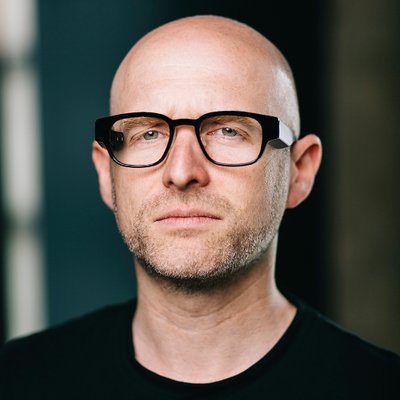
Smart glasses as next-generation computing platform
OTTAWA – Jacob Glick has a pretty good idea about how people are informed and entertained.
Until early 2017, he was part of the executive suite at Rogers Communications as the Canadian media giant’s chief corporate affairs officer. Prior to that, the onetime litigator with major Canadian law firm, McCarthy Tétrault LLP, served three tours of duty with global tech titan Google, heading the public policy and government relations teams in Ottawa, at its corporate headquarters in Mountain View, Calif., and finally in Washington, D.C.
Glick’s gigs have been to highlight the intersection of technology, public policy and law, which he is now doing at North, an Ontario cutting-edge, start-up company where he also plays the role of technology evangelist promoting what he believes is the next-generation platform in computing.
That’s coming from smart glasses, which North – formerly known as Thalmic Labs – designs in Kitchener and makes in nearby Waterloo.
North’s Focals are embedded with a transparent holographic display that brings the smartphone to eye-level in enabling the wearer to access such features as receiving and sending texts, getting street directions and the latest weather forecast, and ordering an Uber driver from Amazon’s voice-recognition service, Alexa, and by the smart glasses’ ability to connect to phones using Bluetooth.
Focals represent the intersection of physics, technology, communication and fashion, as Glick highlighted at the third annual summit of Canada’s Centre of Excellence in Next Generation Networks (CENGN) held in Ottawa’s high-tech hub, Kanata, on Tuesday.
Smart glasses are the latest incarnation in the evolution of computing from mainframes to desktops to mobile devices, each of which has brought “computing closer and closer to you, and deeper and deeper into your everyday life, and in some ways has allowed you to connect better with the people closer to you,” said Glick, general counsel at North and the face of the firm’s vision at this week’s CENGN event. (CENGN is a consortium of industry, academic and research leaders dedicated to accelerating the commercialization of next generation networks.)
“But we know that smartphones, in many ways, are alienating technology. Even though they’re meant to give us the benefits of computing while still allowing us to interact in our lives, most of us spend our lives heads-down.”
“The attention economy, which has facilitated this heads-down, disconnected approach to life is fundamentally problematic because it leads us to question the benefits of computing – to want to go away from all the things that we know that computing can do for us and enhance our lives,” said Glick (pictured above), who was sporting a pair of customized Focals during his presentation.
“We think that by having technology there when you need it, gone when you don’t, we think we can give people the benefits of computing but allow them to continue to interact with people that matter to them. That’s why we think smart glasses are the absolute best technology to facilitate that form of truly personal computing. With you all the time; there when you need them, gone when you don’t, in terms of information.”
He explained that the landscape of previous versions of smart glasses, of which Google, Intel and Samsung have been involved, is “littered with the bodies of attempts” to achieve this subtle, wearable, connecting device.
“The form factor was wrong, because every other attempt to build smart glasses tried to put a computer on your face.” – Jacob Glick, North
“The form factor was wrong, because every other attempt to build smart glasses tried to put a computer on your face,” Glick told the packed hall of CENGN summit attendees, adding that North’s Focals do not “put a phone on your face” either.
“People want first and foremost something that they are proud to wear – that looks good, that’s fashionable.” He said that to create Focals, North – which employs about 450 people, of which over 30 of them hold doctorates and more than 80 have master’s degrees from around the world – also had to overcome enormous scientific challenges.
“The reason why those previous glasses looked dorky is because it is hard to make a display that is subtle, that is not visible to the outside observer, that doesn’t obscure the view of the wearer,” Glick explained. “We had to build a projector that bounces light off a hologram and that light goes into your eye and only you can see that light. Every single pair of glasses is fitted to the individual and every single pair of lenses is custom-made to the individual.”
(The projector and hologram are aligned within less than the width of a human hair.)
Most significant, he added, was that North was able to embed a hologram into a curved lens. No other smart glass manufacturer has been able to achieve that yet. Also of note is that in developing its bespoke smart glasses, North will have amassed over 630 patents by year’s end – one of the most significant patent portfolios both for smart glasses globally and for Canadian companies generally.
North’s high-end, cyber-eyewear, which retail for US$999, are now on display in showrooms on both sides of the Canada-U.S. border, in Toronto and Brooklyn, and are currently only available in non-prescription form. However, the company plans to release prescription Focals (excluding bifocals) in 2019, according to Glick.
Not present in Focals will be an endless stream of ads. “Our vision is focused on getting people information they want and need to make the connections to the people around them better,” he told the one-day CENGN conference.
North’s smart glasses also don’t feature a built-in camera – for now at least.
“Other attempts that have put a camera in [smart glasses] have not done it right,” said Glick. “We think there is a way to do it and we need to figure out the right way because we want to be privacy-sensitive, but also privacy-enhancing.”


